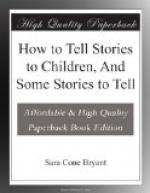Some grass appeared on the path, and the grasshoppers began to sing.
At the end of another hour, Gluck felt that he must drink again. But, as he raised the flask, he saw a little child lying by the roadside, and it cried out pitifully for water. After a struggle with himself Gluck decided to bear the thirst a little longer. He put the bottle to the child’s lips, and it drank all but a few drops. Then it got up and ran down the hill.
All kinds of sweet flowers began to grow on the rocks, and crimson and purple butterflies flitted about in the air.
At the end of another hour, Gluck’s thirst was almost unbearable. He saw that there were only five or six drops of water in the bottle, however, and he did not dare to drink. So he was putting the flask away again when he saw a little dog on the rocks, gasping for breath. He looked at it, and then at the Golden River, and he remembered the dwarf’s words, “No one can succeed except at the first trial”; and he tried to pass the dog. But it whined piteously, and Gluck stopped. He could not bear to pass it. “Confound the King and his gold, too!” he said; and he poured the few drops of water into the dog’s mouth.
The dog sprang up; its tail disappeared, its nose grew red, and its eyes twinkled. The next minute the dog was gone, and the King of the Golden River stood there. He stooped and plucked a lily that grew beside Gluck’s feet. Three drops of dew were on its white leaves. These the dwarf shook into the flask which Gluck held in his hand.
“Cast these into the river,” he said, “and go down the other side of the mountains into the Treasure Valley.” Then he disappeared.
Gluck stood on the brink of the Golden River, and cast the three drops of dew into the stream. Where they fell, a little whirlpool opened; but the water did not turn to gold. Indeed, the water seemed vanishing altogether. Gluck was disappointed not to see gold, but he obeyed the King of the Golden River, and went down the other side of the mountains.
When he came out into the Treasure Valley, a river, like the Golden River, was springing from a new cleft in the rocks above, and flowing among the heaps of dry sand. And then fresh grass sprang beside the river, flowers opened along its sides, and vines began to cover the whole valley. The Treasure Valley was becoming a garden again.
Gluck lived in the Valley, and his grapes were blue, and his apples were red, and his corn was yellow; and the poor were never driven from his door. For him, as the King had promised, the river was really a River of Gold.
* * * * *
It will probably be clear to anyone who has followed these attempts, that the first step in adaptation is analysis, careful analysis of the story as it stands. One asks oneself, What is the story? Which events are necessary links in the chain? How much of the text is pure description?




